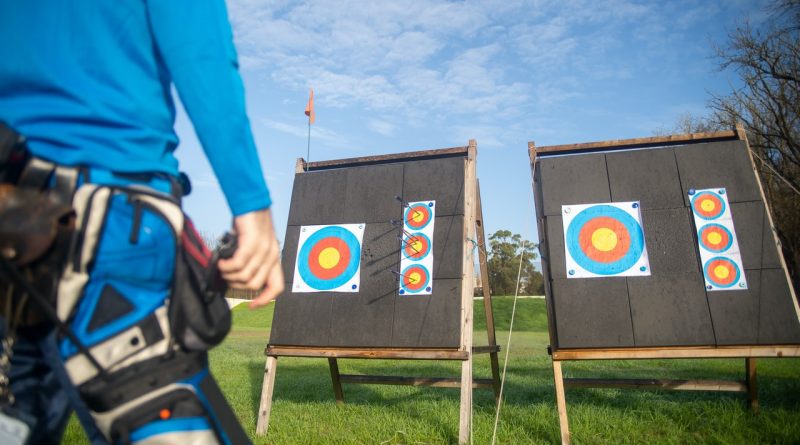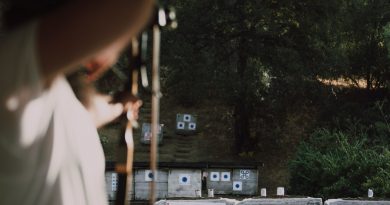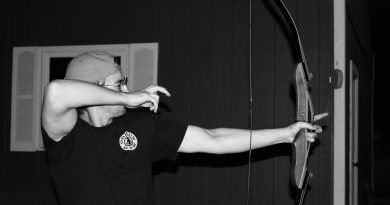Tournaments
Varying degrees of self-consciousness are handicaps which plague all beginners. Fear that lack of skill will prove embarrassing when exhibited in the company of other archers, to the extent that it will prevent us from enjoying the sport, impels us to practice alone, or at the most to confine our company to those whom we know are beginners in the sport.
Since all archers must pass through this initial stage, every effort is made to smooth the transitional period for the novice. There is a sympathetic understanding of the problems faced by the beginner, and encouragement is freely given. A novice is as welcome on the shooting peg as an expert. You need not know tournament rules or procedure to participate. It is common practice to assign an archer, who is attending his first shoot, to a group who are familiar with the rules from participation in previous tournaments. The novice will be coached by his shooting companions, commended for his efforts, and never ridiculed for his lack of ability. To the contrary, the novice will, in the course of the first tournament, receive many tips on how to improve his technique and consequently his score, if he intimates that he would welcome advice and suggestions.
If you still feel that the effort required to enter your first tournament is too much for you, I suggest that you do as I did: leave your equipment at home and attend a shoot in the role of a spectator. Solely from the standpoint of the spectator, I believe a target tournament would permit you to watch more archers in action than a field shoot. However, I now realize that had I taken my tackle to a tournament, I would have been shooting the second round. As a spectator, you should be guided by a few simple rules. Stay behind the shooting line at all times. Remember that the benches and chairs on the shooting line are for the participants. They are not intended as seats for spectators. Avoid loud conversation, or other actions that would distract the attention of the shooters.
You can expect to be under considerable tension, when you participate in your first, or for that matter, any tournament; and your score will surfer accordingly. Very few archers are able to shoot their practice scores in competition. You need not offer any alibi for your score. Others on the line are having or have had their troubles too. Surprising things can happen at a first shoot. Although my total score ranked close to the foot of the list, I did score fifty-two out of a possible fifty-four points on one end of six arrows at fifty yards in target competition. Being very green, I did not understand why I was complimented by my target mates. After all, one arrow had missed the gold by at least an inch. I understand now; that was some years ago, and since that time, I have never managed to improve that end. A perfect end, or as it is commonly called, a “six gold,” has always eluded me. When I know that I have five in the gold, the pressure is just too great, and I am still struggling to put that last arrow in the nine ring.
Having experienced the added thrill of participating in Field or Target archery, you and your fellow club members will begin to explore the possibilities of sponsoring a shoot on your home range. All clubs aim to clear expenses at each tournament; it is not their intention to make a profit. Therefore, set the amount of the registration fee with this purpose in mind.Let’s face it: there is a continuing campaign aimed to divide archers into groups according to their shooting technique. Proponents of one method of shooting would prohibit any deviation from their method. In many sections of the country, tournaments are closed to any archer who does not conform to the host club’s method of shooting a bow. There are groups who restrict competition to those who use a bare bow; to some, an arrow rest and a nocking point on the bow string are abhorrent; other groups permit a fixed sight, and still others divide shooters into two divisions: Instinctive and Free-style, and award prizes in each division. All of these attempts to channel shooting into one method are wide of the main objective. An archer’s primary interest is to loose an arrow and see it fly true to the target. The issue is certainly not how a man shoots, but how well does he shoot? Many archers are able to pass freely from one group to the other and can compile a creditable score in any of the groups. Open competition among all archers will do more to promote the sport and to insure a good attendance at a club tournament than any number of splinter group shoots, each competing for the limited number of archers residing in the locality.
Proper planning, and adequate publicity, given a break in the weather, will insure a successful shoot. The club should appoint a general chairman whose principal duties will consist of coordinating the work of the several committees: a range committee of not less than four members, a publicity committee (one member), a registration committee (two members), and optional, a refreshment committee.
To avoid the possibilities of a conflict of dates with another club in your area which may have selected the same date you have chosen to hold a shoot, the general chairman should contact your state archery association or other coordinating body and secure a list of open dates in your immediate area. It is obvious that competition would cut down on your attendance.
Upon receipt of a list of open dates, the general chairman should preside at a meeting of the tournament committees, and sitting as a committee of the whole, they should choose a date, and at the same meeting, fix a registration fee, and decide whether refreshments should be provided on the field during the shoot.
Provided the several committees are properly informed and perform their several duties, the work necessary to stage a successful tournament will not be unduly burdensome on any one individual. The principle duties of the general chairman and the various committees are set forth herein as a guide in planning your tournaments.General Chairman: coordinates work of the several committees, secures a list of open dates from the state archery association or other governing body, arranges for the services of a field captain and a lady paramount, presents awards at the conclusion of the tournament. The approval of the general chairman should be required of all expenses incurred for the tournament.
Publicity Committee: contacts local newspapers throughout the surrounding area and provides them with prepared copy for publication. If you want good coverage you will find it advisable to prepare complete copy for publication. Furnish local radio stations with prepared copy, and request that the announcement be made on a specified date or dates. To avoid errors, copy should contain at least the following: date of tournament, location of range with road directions so that visitors may be able to locate the field, registration fee, starting time, rounds to be shot, awards and basis of competition, and notice if refreshments are to be sold on the field. Write the secretary of the archery association of which your club is a member for the names and addresses of the secretaries of the archery clubs in the surrounding area. Archers will travel long distances if there is a prospect of a good shoot at the end of the trip. Mail to each of the club secretaries full details of your tournament.
Range Committee: Lay out the range: mark the shooting positions, set up the targets, provide target number markers, new target faces for each target, and in case that you are conducting a target tournament, provide wind pennants, and chairs or benches for the shooting line. As a permanent fixture, erect a flag pole in the central registration area, and fly the flag of the United States during a shoot. It gives a lift to the heart to see it waving in the breeze. Make the presentation of awards in the immediate vicinity of the flag pole, and lower the flag at the conclusion of the tournament. Fly from shorter staffs your own club banner and that of the visiting club or clubs when they are available. They dress up the affair and are excellent publicity for individual clubs. At the end of the shoot, dismantle the field and return promptly all material and equipment provided expressly for the tournament which is not the property of the host club.
Registration Committee: selects and purchases the necessary trophies, medals, and pins. State and National Archery Associations, and frequently federations within a state will, upon request, provide the necessary information and frequently assist in securing these accessories. This committee also secures an adequate supply of score cards and pencils, provides a large ruled summary sheet for the registration desk, and sets up the registration desk in the central area. At this desk are displayed the awards to be made at the end of the shoot. The committee is charged with collecting the registration fee, assigning target numbers, and preparing score cards for each target. At target tournaments it is customary to place the score cards at the sixty yard shooting positions so that controlled practice may be conducted by the field captain before the official starting time. In field shoots, the score cards for each target are issued to the bowman who draws the number one assignment on each target, while the entire group is assembled at the central area prior to the start of the shoot. The committee prepares the summary sheet and makes a record of scores by units and rounds for each archer, compiles the total scores for each participant, and prepares a list of the winners for the use of the general chairman who is charged with the actual presentation of the awards. If your club is holding a classified shoot, ascertain the classification of each bowman as he registers and group the entries on the summary sheet by classes as well as target assignments. In addition to its regular uses, the summary sheet may be used to list the address of each visiting archer, in order that you may be able to notify them by postcard of any future shoots held by your club. A number of clubs disregard class in assigning targets, and assign archers to targets in the order in which they arrive at the registration desk, beginning with the number one target.
At the end of the first round, it is the duty of the members of the registration committee to collect the score cards, check the totals, and reassign the archers on the basis of their total score. High scoring archer is assigned number one on number one target etc.At the conclusion of the tournament, the score cards are turned over to the host club secretary for the record.
Refreshment Committee: Tournaments are conducted in a leisurely manner; a break at the half way point is customary to provide for rest and refreshment. If eating establishments are not located within easy access of your range, consideration should be given to setting up a refreshment booth serving soft drinks, coffee, sandwiches, and ice cream. This food should be sold at regular retail prices charged for these foods when purchased in commercial establishments. Maintain the booth and the surrounding premises in spotless sanitary condition, and serve good food attractively prepared. Place containers at convenient locations for the disposal of trash. The general appearance created at the booth is just as important as the quality of the food offered for sale. Soft drinks should be well iced, and the coffee served fresh and hot. Candy bars have a ready sale, and books of matches should be available for smokers. The visiting bowmen will appreciate the effort you make for their comfort.
Miscellaneous: The wise choice of a field captain will do much to insure the success of your tournament. Extend an invitation to some member of a nearby club to serve in this capacity to avoid any criticism of partiality, however unfounded it may be, to the host club. The field captain should be an experienced tournament archer and one who is thoroughly conversant with the rules governing the conduct of tournaments. At field roving shoots, the captain should be provided with a copy of the official handbook of the National Field Archery Association for ready reference in event a decision is questioned. Target tournaments are governed by the rules promulgated by the National Archery Association.
The scores compiled by participants in pre-scheduled tournaments are a valuable record. They are the best source data from which to compile a uniform system of classification. Double score cards should be used in tournaments for two very good reasons: they provide the best method of keeping an accurate score, and the club secretary should keep one set of the score cards in the club files and send the remaining set to the secretary of the organization with which the club is affiliated.




